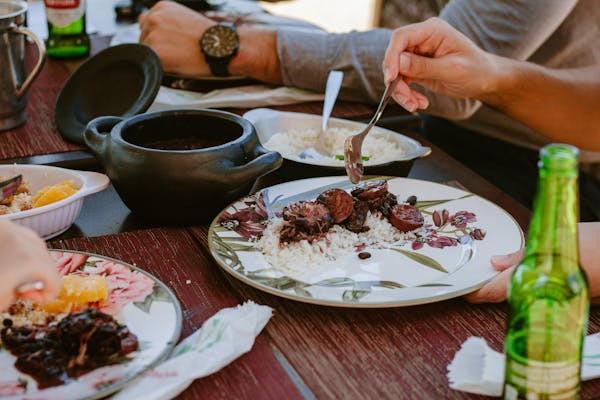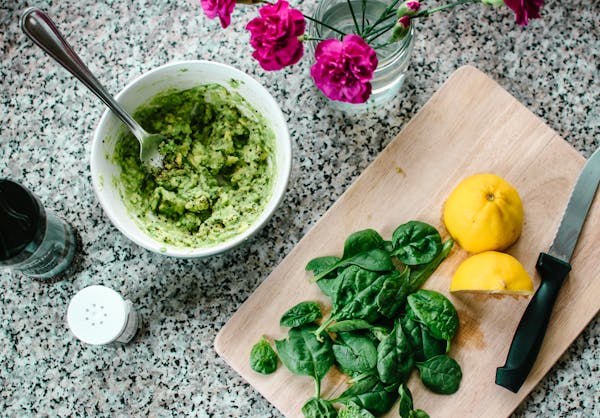Title Tag: Plant-Based Caribbean Recipes: Delicious & Authentic Dishes
Meta Description:
The Caribbean Plant-Based Recipes
Here are 5 plant-based recipes inspired by Caribbean cuisine, emphasizing fresh, vibrant flavors and readily available ingredients:
1. Caribbean Black Bean Soup with Coconut Milk:
Ingredients:
- 1 tbsp coconut oil
- 1 onion, chopped
- 2 cloves garlic, minced
- 1 inch ginger, grated
- 1 scotch bonnet pepper, finely chopped (optional, use with caution!)
- 2 (15 oz) cans black beans, rinsed and drained
- 4 cups vegetable broth
- 1 (14 oz) can full-fat coconut milk
- 1 tsp ground cumin
- 1 tsp smoked paprika
- 1/2 tsp dried thyme
- Salt and pepper to taste
- Fresh cilantro, for garnish
- Lime wedges, for serving
-
Instructions:
- Heat coconut oil in a large pot over medium heat. Add onion and cook until softened.
- Add garlic, ginger, and scotch bonnet (if using) and cook for 1 minute more.
- Stir in black beans, vegetable broth, coconut milk, cumin, paprika, and thyme. Bring to a boil, then reduce heat and simmer for 20 minutes.
- Use an immersion blender or carefully transfer some of the soup to a regular blender and blend until smooth or partially smooth, depending on your preference.
- Season with salt and pepper to taste.
- Serve hot, garnished with fresh cilantro and lime wedges.
2. Plantain and Chickpea Curry:
-
Ingredients:
- 2 ripe plantains, peeled and sliced
- 1 tbsp coconut oil
- 1 onion, chopped
- 2 cloves garlic, minced
- 1 inch ginger, grated
- 1 tsp curry powder
- 1/2 tsp turmeric
- 1/4 tsp cayenne pepper (optional)
- 1 (15 oz) can chickpeas, rinsed and drained
- 1 (14 oz) can diced tomatoes, undrained
- 1 cup vegetable broth
- 1/2 cup coconut milk
- Salt and pepper to taste
- Fresh cilantro or parsley, for garnish
-
Instructions:
- Heat coconut oil in a large skillet or pot over medium heat. Add plantains and cook until lightly browned. Remove from skillet and set aside.
- Add onion to the skillet and cook until softened. Add garlic and ginger and cook for 1 minute more.
- Stir in curry powder, turmeric, and cayenne (if using) and cook for 1 minute.
- Add chickpeas, diced tomatoes, and vegetable broth. Bring to a boil, then reduce heat and simmer for 15 minutes.
- Stir in coconut milk and plantains. Simmer for another 5 minutes.
- Season with salt and pepper to taste.
- Serve hot, garnished with fresh cilantro or parsley.
3. Callaloo with Coconut Milk and Okra:
-
Ingredients:
- 1 tbsp coconut oil
- 1 onion, chopped
- 2 cloves garlic, minced
- 1 lb callaloo (or spinach), chopped
- 1 cup okra, sliced
- 1 cup coconut milk
- 1/2 cup vegetable broth
- 1/4 tsp dried thyme
- Salt and pepper to taste
-
Instructions:
- Heat coconut oil in a large pot over medium heat. Add onion and cook until softened.
- Add garlic and cook for 1 minute more.
- Add callaloo, okra, coconut milk, vegetable broth, and thyme.
- Bring to a simmer, cover, and cook for 15-20 minutes, or until the callaloo is tender.
- Season with salt and pepper to taste.
4. Caribbean Quinoa Salad:
-
Ingredients:
- 1 cup quinoa, cooked
- 1 red bell pepper, diced
- 1 green bell pepper, diced
- 1/2 red onion, diced
- 1 cup mango, diced
- 1/2 cup black beans, rinsed and drained
- 1/4 cup chopped cilantro
- Dressing:
- 1/4 cup lime juice
- 2 tbsp olive oil
- 1 tbsp agave or maple syrup
- 1/2 tsp ground cumin
- Salt and pepper to taste
-
Instructions:
- Combine cooked quinoa, bell peppers, red onion, mango, black beans, and cilantro in a large bowl.
- In a small bowl, whisk together lime juice, olive oil, agave, cumin, salt, and pepper.
- Pour the dressing over the salad and toss to combine.
- Serve chilled or at room temperature.
5. Jamaican Jerk Tofu with Rice and Peas:
-
Ingredients:
- 1 block extra-firm tofu, pressed
- Jerk Marinade:
- 2 tbsp soy sauce or tamari
- 1 tbsp olive oil
- 1 tbsp lime juice
- 1 tbsp brown sugar or coconut sugar
- 1 tbsp ground allspice
- 1 tsp ground thyme
- 1/2 tsp ground cinnamon
- 1/4 tsp cayenne pepper (or more, to taste)
- 1/4 tsp ground cloves
- 1/4 tsp black pepper
- 1 small onion, chopped
- 2 cloves garlic, minced
- 1 inch ginger, grated
- 1 scotch bonnet pepper, seeded and minced (optional, use with extreme caution!)
- Rice and peas (cooked according to your preferred method)
-
Instructions:
- Cut the pressed tofu into cubes.
- Combine all marinade ingredients in a blender or food processor and blend until smooth.
- Pour the marinade over the tofu and marinate for at least 30 minutes, or preferably longer.
- Bake the tofu at 400°F (200°C) for 20-25 minutes, flipping halfway through, or pan-fry until golden brown and crispy.
- Serve the jerk tofu with rice and peas.
These recipes utilize common Caribbean flavors and spices while being entirely plant-based. Remember to adjust spices to your preference, especially the scotch bonnet pepper, which is very hot. Enjoy!






